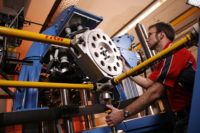After five straight weeks of talks to revise the North American Free Trade Agreement, the U.S. and Mexico finally reached a new trade deal in August.
President Trump called the deal “a big day for trade [and] a big day for our country.” Mexican President Enrique Peña Nieto called it “something very positive for the United States and Mexico.”
For U.S. assemblers, there is much to like. Of the $149 billion worth of auto parts imported into the U.S. last year, 48 percent came from Mexico and Canada, according to the U.S. International Trade Administration. The new agreement promises to increase that. Under the new rules, cars must be built with at least 75 percent of parts made in North America, up from 62.5 percent under NAFTA. In addition, 70 percent of the steel, aluminum and glass used to make a vehicle must also originate in North America.
Another provision specifies that 40 to 45 percent of a vehicle will have to be made by workers earning at least $16 an hour. That could be good for both U.S. and Mexican workers. A major wage gap separates autoworkers in the U.S. and Mexico. An average Mexican autoworker earns $5.21 an hour, and auto parts workers make even less, according to a 2016 analysis by the Center for Automotive Research. That’s about one-fourth the average hourly wage of $21.68 for a U.S. autoworker, according to the Bureau of Labor Statistics.
Reaction among manufacturers has been positive, albeit tempered by the fact that Canada is not part of the deal.
“Today’s announcement is a step in the right direction,” said Jay Timmons, president and CEO of the National Association of Manufacturers. “Manufacturers accept the administration’s position that the 25-year-old NAFTA agreement needs updates. Our hope—for the sake of our workers and a successful manufacturing industry here in America—is that the final agreement will include all three of the original signatories: the United States, Mexico and Canada. Because of the massive amount of movement of goods between the three countries and the integration of operations which make manufacturing in our country more competitive, it is imperative that a trilateral agreement be inked.”
“We are pleased…that the U.S. and Mexico have reached a consensus on several issues, including automotive rules of origin,” added Mitch Bainwol, president and CEO of the Alliance of Automobile Manufacturers. “Automakers urge the U.S. and Mexico to quickly re-engage with Canada to continue to build on this progress. The industry is hopeful that any changes to NAFTA auto rules of origin continue to strike the right balance by incentivizing production and investment in North America, while keeping new vehicles affordable for more Americans.”
Will Canada get on board? Will Congress approve the deal before year’s end? Stay tuned.




